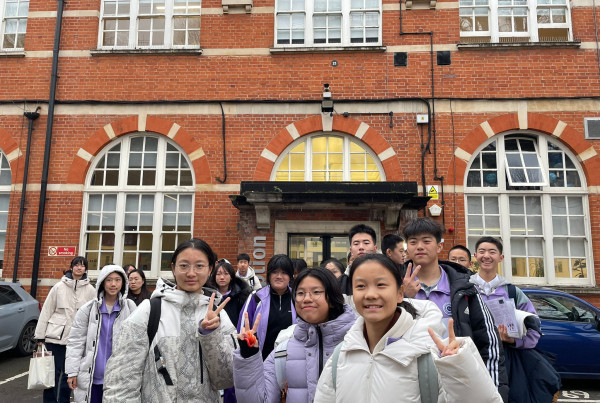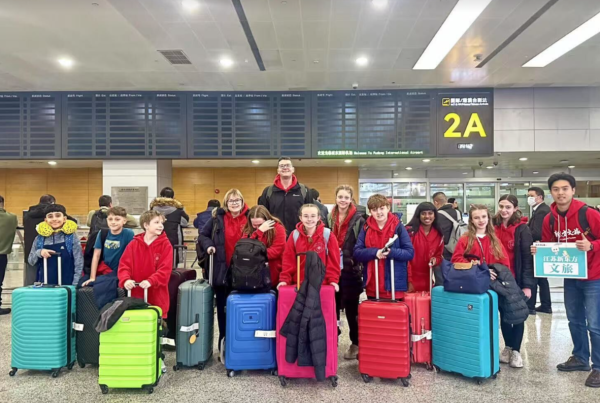Globeducate has always taken pride in prioritising safeguarding and wellbeing across its seventy schools in eleven countries. This includes safeguarding training for all staff, anti-bullying and body confidence initiatives, and a strong commitment to online safety.
In September 2024, the organisation appointed a Head of Wellbeing to further develop this provision. Having led wellbeing programmes in two previous schools, Rhiannon Phillips-Bianco took on the role with the goal of building a sustainable, proactive approach to wellbeing and mental health. As she completes her first year, she reflects on the successes, challenges, and key learnings.
A Proactive Approach for the Whole Community
Our programme supports students, staff, and parents through a structured, evidence-based approach grounded in Positive Psychology principles, taking a proactive rather than reactive stance on wellbeing and mental health.
Termly Wellbeing Themes
We established termly wellbeing themes and invite all teaching staff to attend a training webinar to launch each one. Themes are selected based on feedback from Designated Safeguarding Leads (DSLs) and Wellbeing Leads, as well as data from PASS assessments and MyConcern (a digital platform for managing safeguarding concerns). This year, our themes were Digital Wellbeing, Healthy Relationships, and Developing Self-Esteem. Next year, they will be Belonging, Emotional Literacy, and Social Skills.
The webinars provide evidence-based, age-differentiated tools and strategies to support student wellbeing, presented in accessible and engaging ways, for example, by adopting a “Digital Five-a-Day” initiative. Recordings are made available for later access.
In addition to these themes, a third of our schools participate in a Body Confidence project for secondary students, which includes a training webinar, lesson materials, and follow-up support. All schools also take part in Kindness Counts week, or an equivalent initiative, which promotes a strong anti-bullying message.
Ongoing Support
It’s essential that a wellbeing initiative isn’t just a tick-box exercise. Ongoing support that reaches all members of our community is fundamental. To help staff embed wellbeing into daily routines, a Wellbeing Strategy of the Week is shared every Monday morning.
Aligned with the term’s theme, these strategies are age-differentiated (for ages 3 to 7, 7 to 11, 11 to 14, and 14 to 18) and include relevant research and/or practices for staff too. In our first term alone, over 8,000 students engaged with these tools weekly.
In the second half of each term, a webinar is held for parents, sharing the strategies being taught in school and offering suggestions for the home.

These are shared on YouTube, allowing our multilingual community to choose subtitles in their preferred language. With over 3,350 views, we’ve been delighted by our community’s interest in wellbeing. We’ve also gained insights from the data, such as a notable spike in interest around supporting teens with exam stress. This has shown us the clear need for targeted resources. As a result, next year we will offer continued support for parents and provide more specific guidance for staff on how to support families (and themselves) during exam periods.

Flexibility is Fundamental
Given the diverse needs of our schools, whether cultural, religious, linguistic or situational, it is vital that our programme remains flexible. While we encourage schools to follow the weekly focus, we understand that resources and strategies may need to be adapted or replaced to suit local contexts. Wellbeing teams are therefore empowered to modify them and request additional support when needed.
Three stand-out successes for me have been:
- Collaborating with school psychologists in two of our schools in Cyprus. In response to a local need for mental health first aid training, we combined expertise to create staff training delivered by on-site psychologists. While providing a consistent framework is important, empowering teams to respond to their unique school contexts using in-house expertise is equally vital.
- Leading two days of INSET at Mougins British International School in France, which resulted in the creation of a Staff Wellbeing Team. This led to several initiatives, including the launch of a Walk and Talk mentoring programme, an approach that had already seen success at Rome International School in Italy. With over twenty teachers volunteering as mentors, multiple students now receive informal mentoring or coaching where appropriate.
- Remaining open to learning, every single day, from students, staff, and parents. I lead wellbeing across the group three days a week and spend the remaining two days based at Rome International School. Being school-based is vital for keeping me grounded, staying connected with current issues, and trialling new approaches, while remembering that what might be effective in Rome, might not work elsewhere, and vice-versa.
At the heart of our sustainable approach are the core resources, including webinars, assemblies, and practical tools and strategies, paired with the flexibility and openness to adapt them to each school’s specific needs.





